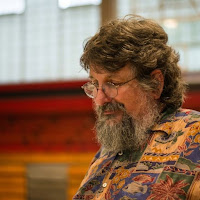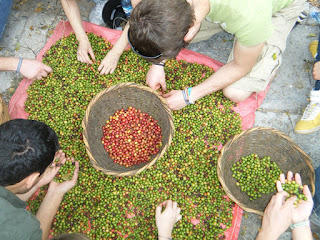I am very pleased to be sharing some coffee and some coffee talk for employees of my university, at the invitation of the Wellness Committee in our human resources department. I have put together some slides for those who attend and for those who are curious. This is a bit of a potpourri of coffee concepts.
Coffee through Geography & Geography through Coffee
#thankthefarmers
Monday, December 12, 2022
Saturday, November 5, 2022
NESTVAL's Second Century
Today I am at Salem State University for the 100th annual meeting of NESTVAL, the oldest geographical society in North America. My BSU colleague Dr. Bob Amey and I are offering a short presentation about the importance of outreach to K12 teachers and students, entitled Geographic Literacy in NESTVAL's Second Century.
Many of the slides used in my part of the talk are selected from a longer presentation I gave with Dr. Vernon Domingo for the virtual NERC 2020 conference, EarthView: World Beyond Borders. I mention it here for those who might enjoy the additional maps and links.
Saturday, October 22, 2022
Potato Novitiate
Earlier in 2022, I thought I might earn another title, as Potato Maven. As the never-ending slew of 2020 setbacks continued, I became distracted from those ambitions. I also began to see just how vast the world of potato knowledge would be (this came as no surprise, actually), so I am considering myself -- at best -- a Potato Novitiate.
My identity as an educator, however, is more bridge than expert. So whatever I do know, I am happy to share. My first (and perhaps only) foray into the world of potato education is Potato Geographies, a presentation that is part of the One Book One Community programming around Stephen Puleo's beautiful and important narrative non-fiction, Voyage of Mercy.
Potato Geographies contains all the slides from my October 26 presentation (2pm) at the Bridgewater Senior Center on Wally Kruger Way.
Friday, October 7, 2022
World Migratory Bird Day
Please see the post below, from our friends at Dean's Beans. It comes just a day after I spoke about the importance of coffee practices in the protection of migratory birds in my Geographies of Migration course for BSU Senior College. Please do not go birdwatching with a cup of commodity coffee in your hand. The good stuff does a lot of good!
Thursday, September 15, 2022
Geographies of Migration
This fall, I am leading a new course for BSU Senior College: Geographies of Migration. As promised to the participants, the slides I use for the course will be posted here, along with recordings of each session.
We began on September 15 with Part 1: Geographic Principles.
We continued on September 22 with a story of migration in the place where my life as a geographer truly began in Part 2: Rondônia. I have added a couple of photos to these slides as a result of questions we had at the end of our session. They are after the slide in which I show three relevant book covers. I also want to call attention to one link within the presentation that I did not get to during the session: the story of the artist Anká, which is included in a newsletter I wrote for friends and family during my first visit to the region in 1996.
I have also added a map of the entire Amazon that puts the EFMM railroad in spatial context. It is like a proverbial needle in the haystack of that map -- taking up only a very small portion in the southwesternmost extremity of the map.
The slides for Part 3: Cabo Verde provide far more than I could get to during our session of September 29. Feel free to explore! As I have said, anything in these slides that looks like a link is a link, and though many of these are in Portuguese, many are not.
During our October 6 session, we explore non-human migration in Part 4: Migrations Avian, Mammalian, Insectile, and Arboreal. As I mentioned during the session, these slides include quite a few links to further information. I especially recommend the links related to monarch butterflies.
The October 13 session is entitled Part 5: U.S./Mexico Border and subtitled "where I'm coming from" because a lot of my thinking about migration was shaped by seven years spent in the borderlands.
BONUSES (that is, stories about migration I've noticed recently):
The September 27 episode of the marvelous WBUR program On Point explores many aspects of migration related to climate change. I have included a link to the program and some of my own notes on my "main blog" as Buffalo and Other Climate Havens.
The Hulu series Taste the Nation with Padma Lakshmi (see also the show's official page) is a course on migration, in the sense that almost every episode features a delicious culinary tradition brought to the United States by migrants from other lands to a specific community in the United States. The "almost" refers to the fact that two episodes focus on the foodways of indigenous communities. All of the episodes have three elements: conversations with community members from multiple generations, visits to one or two restaurants operated by members of that community, and Lakshmi learning to make on a representative dish. The host is herself a migrant, having moved to the United States at the age of four. This is a food show that might bring tears to your eyes.
When Bela Lugosi was filming Dracula in 1931, the set was in use 12 hours a day. A producer from Mexico convinced the studio to film a Spanish version of the same movie in overnight shifts, in what became a classic tale of immigrant pluck and determination. A film about that film is in production now; Mandalit Del Barco tells the tale of Spanish Dracula for Morning Edition.
It so happens that World Migratory Bird Day (and the importance to these birds of good coffee practices) was celebrated the day after we talked about the migrations of birds, insects, and trees.
Tuesday, July 12, 2022
World of Coffee
I am very pleased to be spending this week teaching World of Coffee as part of a summer content institute offered to area teachers through my friends at Framingham State University. Last summer I was pleased that my Sodade: Cape Verde Is Migration was one of ten presentations on the important topic of migration.
This summer, I am pleased to be presenting an entire program, World of Coffee, which FSU geographer Dr. Judith Ott has helped me to develop and organize. The course is a hybrid model involving JavaTrekker, Café Visits, films and discussion on campus, and some synchronous meetings online.
This post is meant primarily to give participants -- and others who are interested in coffee -- convenient access to the slides I am using in those Zoom meetings. Links to most course materials are in the course schedule.
These include Making the Coffee Belt and Climate Cups.
Friday, May 13, 2022
Collaborative Online International Learning (COIL)
 |
| Livable Cities COIL Collaboration Faculty Team |
Wednesday, April 13, 2022
Coffee Maven Explores Chocolate and Tea
Last September, I was pleased to teach Coffee World, a four-part online course for BSU Senior College. It was a nice opportunity to develop a program that was shorter than a college course but allowed me to delve a bit deeper than I had in previous public lectures.
I was delighted that at the end of this course, several participants wanted to keep exploring, and some of them mentioned being interested in tea and chocolate. I do not have maven-level experience in these, but I do know a bit and I welcomed the opportunity to learn a bit more!
Hence this six-part course exploring the geographies a few other beverage-related crops:
The beverage cups of the world are warmed by three beverages that grow on trees. That is not strictly true, of course, but the fruits and leaves from which coffee, tea, and chocolate are derived do grow on trees and shrubs that are cultivated and harvested by hundreds of thousands of skilled workers in dozens of countries. They make their way to customers in every country of the world through complex patterns of processing and trade that have developed over centuries. This six-week online course begins with an introduction of all three beverages through the lens of museums dedicated to each. The next four weeks are devoted to the spatial patterns, environmental problems, and human-rights issues in chocolate and tea. We spend the final session applying the same geographic approach to other specialty crops.
I thoroughly enjoyed both of these courses -- meeting weekly with some old friends and new ones via the magic of Zoom. I was delighted that my mother-in-law was able to participate all the way from Maryland.
Tuesday, March 15, 2022
Coffee World @ Linden Ponds
Reminder: I post to this blog infrequently because it is a portal to other, more active outlets. The early posts (see archives at right) point to general lists of blogs and classes. The posts that are "on top" are often links to ongoing or recent presentations.
In "normal" times I give presentations to off-campus audiences, including schools on a weekly basis and various community groups on a monthly basis or more. Like everything else, this has been curtailed for the past 24 months, and all of my presentations (include several featured on this site) have been virtual.
As I write this, I am pleased to be returning to in-person community presentations. Few will be surprised that the topic is coffee. I am reprising a course I taught online for BSU Senior College in September (I am currently doing a different online course for that group). The course is Coffee World, a four-part overview of my approach to coffee as both a global product and a local nexus where communities gather.
The Coffee World course outline includes a description of each session and links to the slides I am using.






